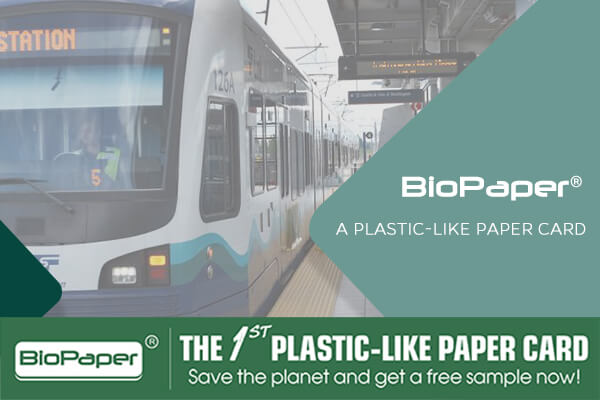For urban mobility, few applications are being developed where the RFID technology could support an effective tracing system of both persons and vehicles in Public Transport Networks (PTNs). Transport providers are challenged to put affordable, easy, environmentally safe, and secure public transport services in place all over the world. In public transport, the management uses RFID technology to augment the location information provided by a GPS-based bus tracking system. RFID tickets and cards made of BioPaper have proven to withstand the constant handling of the public transportation sector as they are tear-resistant and waterproof.
The RFID system in public transportation
The BioPaper RFID card allows authentication of passengers and payment. The designed system consists of RFID cards as OBU (On-Board Unit), e-ticket, access point at a stop location, network, and management revenue server. When a passenger enters or exits the vehicle, they will do the payment on OBU that is installed in the vehicle by tapping the RFID card. The OBU reads the passenger’s data and sends it to the server. For access control of the server, OBU will connect to a network through an access point at the bus stop. For each passenger, the server will receive data from OBU twice. The data consist of the stop location and passenger ID. The BioPaper RFID cards and tickets can also be used for;
Access control
In this COVID-19 era, the public transport sector wants to minimize cash exchange due to the spread of the virus. On a typical day, no matter how you choose to pay, people may make half a dozen payments. For users who have purchased the ticket, they are guaranteed access rights whether it is a single-use ticket or a monthly, daily, or yearly pass. For the users to gain access to the barriers, they present their ticket close to the RFID reader which will validate their journey. To renew the ticket, add more credit to it via the ticket offices or automated payment kiosks. The RFID cards are great for speeding up the process of issuing tickets for the public transport sector. These cards have reduced human errors and queuing times which has greatly maximized customer satisfaction. For access control, the information in the RFID cards is fed into the IT system and WMS is sent via GPRS to the vehicle’s telematics system.
Also, the public transport vehicles can be seamlessly tracked using the cards and the management will know where the vehicle will be at any given time. The RFID cards can also identify the vehicle when arriving at the terminus.
Making payments
One of the fastest-growing markets for security ICs and the smart card is the public transport sector. In this sector, the BioPaper RFID card can allow passengers to make payment by simply tapping or waving the card at the payment terminal. The card communicates with the payment terminal using radio frequency instead of a magnetic strip. BioPaper enabled RFID cards to have a symbol that represents radio frequency that is used by the card to make it contactless. RFID cards are effective and secure payment methods that are reliable and convenient. In public transportation applications, BioPaper RFID cards increase efficiency significantly with several million passengers that need to be equipped with convenient and reliable access solutions per day.
Ticketing operators have to deliver superior and great speed contactless performance. The ticket validation process is quicker than manual stamping which offers a convenient entry process for passengers. The BioPaper RFID paper ticket is an environmentally friendly card that allows a passenger to pay for their transport ticket.
Learn more about BioPaper card.
